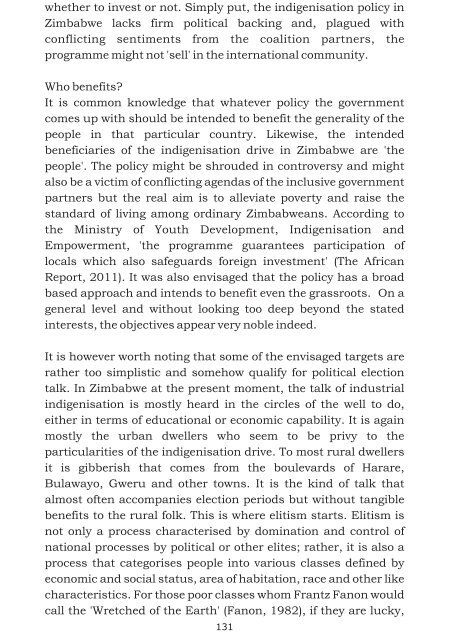Beneficiaries are actors too.pdf - Southern Institute of Peace ...
Beneficiaries are actors too.pdf - Southern Institute of Peace ...
Beneficiaries are actors too.pdf - Southern Institute of Peace ...
Create successful ePaper yourself
Turn your PDF publications into a flip-book with our unique Google optimized e-Paper software.
whether to invest or not. Simply put, the indigenisation policy in<br />
Zimbabwe lacks firm political backing and, plagued with<br />
conflicting sentiments from the coalition partners, the<br />
programme might not 'sell' in the international community.<br />
Who benefits?<br />
It is common knowledge that whatever policy the government<br />
comes up with should be intended to benefit the generality <strong>of</strong> the<br />
people in that particular country. Likewise, the intended<br />
beneficiaries <strong>of</strong> the indigenisation drive in Zimbabwe <strong>are</strong> 'the<br />
people'. The policy might be shrouded in controversy and might<br />
also be a victim <strong>of</strong> conflicting agendas <strong>of</strong> the inclusive government<br />
partners but the real aim is to alleviate poverty and raise the<br />
standard <strong>of</strong> living among ordinary Zimbabweans. According to<br />
the Ministry <strong>of</strong> Youth Development, Indigenisation and<br />
Empowerment, 'the programme guarantees participation <strong>of</strong><br />
locals which also safeguards foreign investment' (The African<br />
Report, 2011). It was also envisaged that the policy has a broad<br />
based approach and intends to benefit even the grassroots. On a<br />
general level and without looking <strong>too</strong> deep beyond the stated<br />
interests, the objectives appear very noble indeed.<br />
It is however worth noting that some <strong>of</strong> the envisaged targets <strong>are</strong><br />
rather <strong>too</strong> simplistic and somehow qualify for political election<br />
talk. In Zimbabwe at the present moment, the talk <strong>of</strong> industrial<br />
indigenisation is mostly heard in the circles <strong>of</strong> the well to do,<br />
either in terms <strong>of</strong> educational or economic capability. It is again<br />
mostly the urban dwellers who seem to be privy to the<br />
particularities <strong>of</strong> the indigenisation drive. To most rural dwellers<br />
it is gibberish that comes from the boulevards <strong>of</strong> Har<strong>are</strong>,<br />
Bulawayo, Gweru and other towns. It is the kind <strong>of</strong> talk that<br />
almost <strong>of</strong>ten accompanies election periods but without tangible<br />
benefits to the rural folk. This is where elitism starts. Elitism is<br />
not only a process characterised by domination and control <strong>of</strong><br />
national processes by political or other elites; rather, it is also a<br />
process that categorises people into various classes defined by<br />
economic and social status, <strong>are</strong>a <strong>of</strong> habitation, race and other like<br />
characteristics. For those poor classes whom Frantz Fanon would<br />
call the 'Wretched <strong>of</strong> the Earth' (Fanon, 1982), if they <strong>are</strong> lucky,<br />
131


